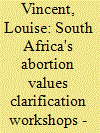| Srl | Item |
| 1 |
ID:
106373


|
|
|
|
|
| Publication |
2011.
|
| Summary/Abstract |
A rich literature exists on local democracy and participation in South Africa. While the importance of participation is routinely built into the rhetoric of government, debate has increasingly focused on the dysfunctionality of participatory mechanisms and institutions in post-apartheid South Africa. Processes aimed ostensibly at empowering citizens, act in practice as instruments of social control, disempowerment and cooptation. The present article contributes to these debates by way of a critique of the approach used by the South African state, in partnership with the non-governmental sector, in what are called abortion 'values clarification' (VC) workshops. This article examines the workshop materials, methodology and pedagogical tools employed in South African abortion VC workshops which emanate from the organization Ipas - a global body working to enhance women's sexual and reproductive rights and to reduce abortion-related deaths and injuries. VC workshops represent an instance of a more general trend in which participation is seen as a tool for generating legitimacy and 'buy-in' for central state directives rather than as a means for genuinely deepening democratic communication. The manipulation of participation by elites may serve as a means to achieve socially desirable goals in the short term but the long-term outlook for a vibrant democracy invigorated by a knowledgeable, active and engaged citizenry that is accustomed to being required to exercise careful reflection and to its views being respected, is undermined. Alternative models of democratic communication, because they are based on the important democratic principles of inclusivity and equality, have the potential both to be more legitimate and more effective in overcoming difficult social challenges in ways that promote justice.
|
|
|
|
|
|
|
|
|
|
|
|
|
|
|
|
| 2 |
ID:
164035


|
|
|
|
|
| Summary/Abstract |
Social relations, institutional arrangements and cultures bequeathed by South Africa’s system of apartheid continue be felt in the present despite the country’s formal transition to democracy 25 years ago. Race, class and gender inequities continue to structure South African society in ways that have proven intransigent to change, leading to growing frustration and widespread public dissatisfaction expressed in multiple arenas including worker strikes, service delivery and university student protests. While it is clear that social structures inherited from the past are difficult to change, it is also the case that change does happen. In this paper, we discuss the findings of a hermeneutic phenomenological study with 10 academics at one historically White university in South Africa, who have been agents of change within their particular context. We show how participants engaged in struggles to counter resistance to their efforts. In doing so they demonstrate what we call ‘strategic competence’ – the ability to act in ways that not only draw on personal resources but recognise the resources, contradictions and opportunities offered within the existing limitations of the social structure. Strategic competence thus emerges as a central feature of agency, enabling individuals to stretch the boundaries of what is possible.
|
|
|
|
|
|
|
|
|
|
|
|
|
|
|
|